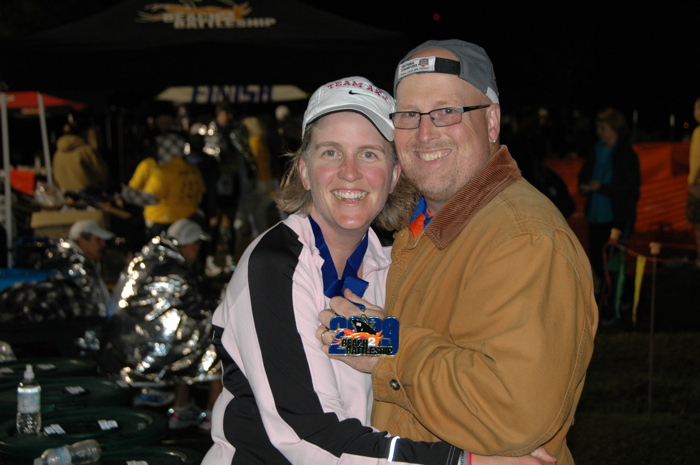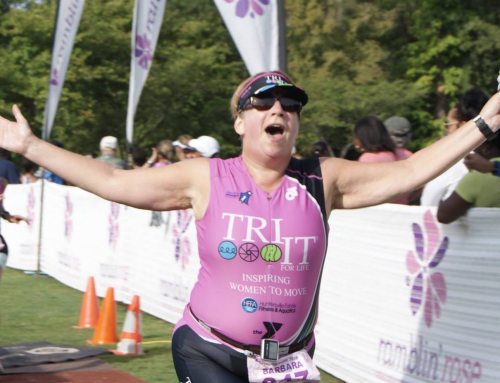
By Alyse Kelly-Jones
Just saying the word triathlon out loud has power, a lot of power. Once you’ve said the word out loud, it becomes real and you’ve taken your first step from the couch to the finish line.
You’ll find that after 10 weeks of training and working and practicing, and making a lot of new friends who share the same goal as you, the actual event itself isn’t the hardest part. The hardest bit might be staying motivated to do all that training and working and practicing with your new friends.
One of the best ways to get motivated and stay motivated is to surround yourself with people who believe in you. When I was training for my first triathlon, I had a supportive family and more friends than I could count all helping and encouraging me. The friends were all women and men I met while training, folks who knew what I was going through and how best to help me.
After all these years competing in triathlon, I’ve found people who are stuck in an unhealthy lifestyle are like explorers who get stuck in quicksand. The only way they’re going to get free is to yell for help or to have people drag them out.
Even when you’re surrounded by support and are saying triathlon every 17 seconds, you can still find your motivation flagging after weeks of exercise. The unexpected exercise and effort can start to seem too much. That’s when you need to look around you and try and find some new motivation, other than just finishing your race.
Whenever the couch starts calling me, or the cool side of the pillow starts talking about how wonderful it would be to cradle my head for a few more hours in the morning, I counter by thinking up another goal to accomplish during my upcoming race.
Some goals might be to win my age category, to use multi-sport training as a method for losing even more weight, or even a desire to finish a (relatively) long race. Whatever the motivation, I’m glad it helps me to continue to use multi-sport training, which I think is the perfect vehicle to get me in motion and healthy.
At first, my goal was to finish just one triathlon. Well, all right, that’s not quite true. My main goal was to do one triathlon and survive. Survival, at least of my image of myself as still athletic, motivated me through my 10-week training program for a sprint triathlon.
Most sprint triathlons are (relatively) short: 250-meter swim (five lengths of a pool), maybe 10–15 miles on a bike and a 5k run at the end. If you break it down, though, you’ll see that each of the parts is eminently doable. Get better at one. Get better at another. Get better at the last. Then all you have to do is put them together.
And once you finish that first sprint triathlon, well, you’ve launched yourself out into space. All you need is a rocket to motivate you out and on to bigger and better things.
I’m not talking about only women here. I know this sort of approach also works for men. For instance, my husband was athletic, for certain overweight values of athletic, for most of his life, but he knew he’d never be able to do a triathlon—until he saw me compete in and finish a number of triathlons. Then he found his motivation (basically, his competitive instinct). If I could do something, he was sure he could as well. And he did. He learned how to swim, how to cycle, and how to, if not like, then at least tolerate, running.
Because of that constant desire to prove to himself that he could do something, he was motivated enough to finish several triathlons. All of them after he had a heart attack in 2004.
Which goes to show that your current health levels don’t really factor into this. You have to set a small goal, achieve that, and then move on to the next—slightly harder—goal, achieve that and then move on. Constant goal-setting, followed by constant achievement, followed by constant support from those who believe in you are great ways to keep yourself motivated. I mean, how can you stop when you keep getting better and proving to everyone that you can do this whole crazy triathlon thing?
The most important part of this whole process, though, really is that clichéd first step. If you have to, just roll off the couch and thump to the floor. Instead of getting depressed about being on the floor, use that position to do your first push up. And then your second. And then your third.
You’re on your way. I’ll see you at the finish line.
# # #
Alyse Kelly-Jones is an obstetrician and gynecologist with Mintview Women’s Care (http://www.mintview.com) and the founder of Tri It For Life (http://www.triitforlife.com), a not-for-profit group dedicated to inspiring women to move and discover fitness and friendship through multisport training by finishing their first triathlon.






